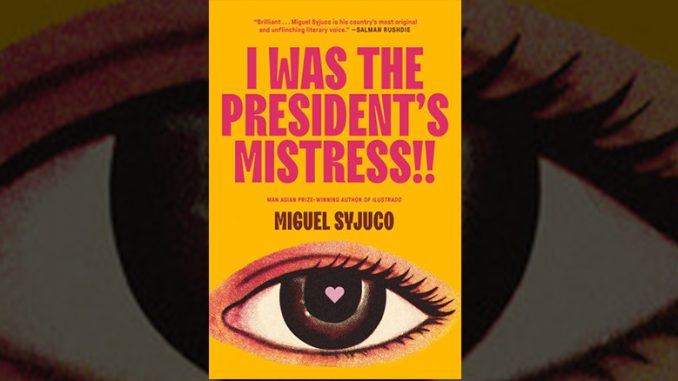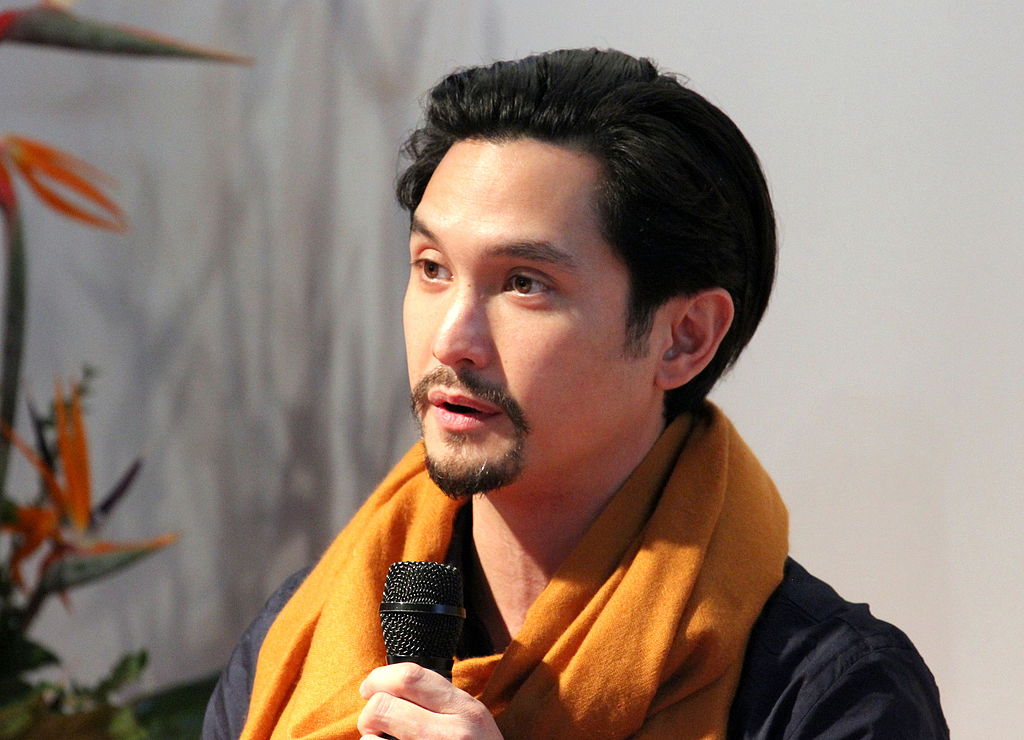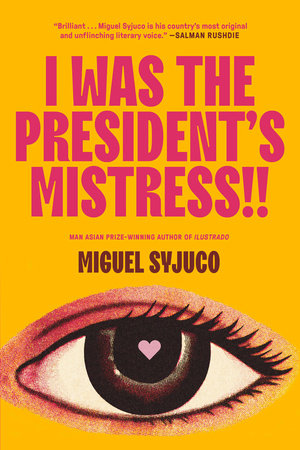
Title: I was the President’s Mistress!!
Author: Miguel Syjuco
New York: Farrar, Straus and Giroux, 2022. 384 pp
Miguel Syjuco and his promiscuously luscious novel
When a novel kicks off with an interrogation of the phallus, or “pitutoys of powerful men” – “bigger than you’d guess, smaller than he thinks” – you’d realize that this primeval badge of male potency and authority seem to lack nearly everything it needs to survive the scrutiny of fiction’s petri dish. Save one: that some of them can actually fit in a petri dish.
What better way for power to limp ’round town than to taunt it, sneer at its claims to entitlement? In this regard, Renaissance social philosopher Sir Thomas More seems to know the erstwhile Morningstar all too well: “The devil…the prowde spirite… cannot endure to be mocked.”
However, in a country that jails and murders its writers and journalists, landing as one of the worst places in the world to practice free expression, satire can push a writer in the jaws of a libel case. And that’s on a good day.

Regardless of the risks, I was the President’s Mistress!! is where author Miguel Syjuco, Man Asia Prize winner for his previous novel, Ilustrado, takes the devil by the tail and slams him on a wall in the wittiest tongue-in-cheek rendition of a loud “ouch!” His newest novel published by Farrar, Straus and Giroux (2022) breaks all the conventions of novel writing by reintroducing Filipino audiences – and the world – to this hilariously ingenious satire as a formidable truncheon against power in excess.
In the context of the Filipino reader, this is easier said than done. It has been claimed that everyday Filipinos can hardly tell sarcasm from someone belting out his cover of Frank Sinatra’s My Way, which, again, in the Filipino context, could get one shot in the mouth. Imagine where a full-length satire can do to an author.
Besides, enraging polite society has never been “business as usual” for the country’s inflation-battered and corruption-choked social strata, royalties-starved Filipino novelists included, save for those who risk being tagged as “terrorists” or “communists”. Perilous as this may sound, many still choose the latter.
The novel, fashioned out of “12 of 13 interviews” from “raw MPEG-4 files” featuring the President’s alleged mistress – Vita Nova, “hashtag-no-filter” – forms this “celebrity tell-all memoir”.
“Our setting: a sweating, heaving country where the future’s always promised, and men act like boys, and women are punished for not putting up with it. The time: ever now. The plot: a lost lass rises from the ashes; a desperate assassin brandishes a pistol; a government is set to fall to a scandal everyone calls Sexy-Sexygate. Among the players: a flawed dreamer who boxed and acted his way to the presidency; his Koran-toting nemesis in the Senate; a horny bishop; a cowboy turned warlord; an American naval officer offering a way out; a washed-up reporter redeemed by one last scoop; a poor little rich boy dying with his dynasty; and of course, a high school sweetheart gone cray from decades of disappointment…”
Vita Nova herself offers a proviso in her first of thirteen transcripts (all in all 24 voice recordings of different interviewees, 12 of which belong to Vita): “Viewer discretion is advised.”
The object of Vita Nova’s timeless revulsion is her boy-toy, Philippine president Fernando Valdez Estregan. He’s the fictional mongrel-turned-Chief Executive his mistress and current political rival describes as “Mr. Suavé, the southpaw gangster with a castrato tenor’s wounded soul.”
To Filipino ears, the name summons ghouls of dictators past, with body parts stitched like a rag doll using fiction’s bloody needle. Syjuco skillfully reanimates Frankenstein’s monster to reveal long-buried sins and secrets, one of which echoes the late dictator Ferdinand E. Marcos’ romantic fling with American actress Dovie Beams.
One has got to hand it to Syjuco to spellbind an audience tickled pink at the very mention of power’s indignities and scandals.
At first, the novel seems like an exhausting read, giving James Lasdun of the New York Times some justification when he writes: “The drawback with these aggressive verbal stylings is that a little of them goes a long way. The men are restricted to a single monologue each, which feels about right. But Vita, whose idiolect necessarily treads a fine line between amusing and annoying (the story requires her to remain lovable even as she appalls), has 12 rounds, and at a certain point the fire hose of tabloid scandal and porn-tinged political machination that is her life threatens to overwhelm.”
But that Lasdun, too, admits that this is “intentional” on the part of Syjuco is accurate. See, Philippine politics and the scandals that cling on its skin like leeches overwhelm in ways not even the august New York Times will be able to anticipate. To hazard a guess: Syjuco may have, by design, whipped up a storm to give his readers a feel of what moves in endless cycles in this little teacup of an archipelago. There is so much to unpack here that it’s only necessary to soldier on, as a reader, word per venerable word, if only to get into the mood of things. And this Syjuco did radiantly as any Filipino caught between a rock and a hail of bullets would understand.
Of course, there’s always the sanctimonious ratpack to contend with, what with religiosity being the country’s biggest hustle. It is, by all standards, a compelling read, that is, if the reader’s sensitivities aren’t as raw and tender as wounds that refuse to heal. In the Philippine setting, scandals make for good newspaper copy, and the more picturesque, the better. Sex and violence alone do not get as much attention as Malacañang’s main man caught with his pants down.
As Vita Nova herself reiterates in the novel: “Better savage than average.”
Syjuco breathes into being a phantasmagoria of voices beginning with Vita Nova’s – a seamstress daughter turned celebrity idol turned “damsel rising to power” – and thereafter a slew of lovers dating back to her teenage years. The revelation itself is dynastic in tone, carried through by explosive succession, with love, politics, religion, history, the flesh trade, and an ongoing bloody war on drugs queueing up as beads to a memoir that is everything but begging to be consoled.
No, Vita Nova wouldn’t deign solicit her audience’s pity. If anything, she was a riot, alternatingly endearing and shocking, a virtual blizzard in the face of power’s threats and opposition. Like vengeance, she serves her arrows cold. In her eighth transcript, she avows, “Like I’m not perfect (I contour), but I’ll never hide – not behind filters, façades, or fake news. Not anymore at least. Especially not from all the hate-following trolls out to cancel me.”
In fact, on Vita Nova’s 11th transcript, the President’s mistress goes full throttle, well-nigh trigger-happy with her outbursts. On the note that politicians are to blame for society’s pitfalls, she says, “We’re right to blame them for all that’s wrong with the country – except the fact that we put them in power. The biggest conspiracy is that it’s always someone else’s fault – I see, says the blind man, even if he doesn’t.”
Democracy in this former American colony is anything but. The right to choose the country’s leaders, among other things egalitarian, is often mistranslated into might is right; thus, only the rich run for office. Being an archipelago of a little more than 7,000 islands doesn’t make plutocracy any easier. Most every politician sits as warlord of his own domain, complete with guns, goons and gold. Vote buying, in fact, is such a welcome narrative that presidential elections are, more often than not, celebrated as the day for “tax rebates”.
Election year also brings to fore the unwelcome anticipation of violence and voter harassment. Hotspots stretch from Cavite and Batangas all the way to Maguindanao, forming a veritable Ring of Fire that has been traumatizing the nation’s confidence in the electoral system for decades. The last 100 days on the run-up to the polls prove catastrophic to both candidates and voters who could not tell where the next bullet or P5,000 would be coming from.
In one entry, Vita Nova shares the same fears.
“I admit, I’m scared to go out there tomorrow. To stand before the country at Plaza Miranda. To see another gun in the crowd. Terrifying, but worth it. People are worth the risk. Filipinos are worth dying for – but even more so, living for. Day by day, till everything’s better for everyone.”
 What is truly laudable is the author’s empathetic treatment of Vita Nova. Syjuco crumples all stereotypical renditions of “mistresses” and woman in his latest novel. She doesn’t come off as a penny-pinching strumpet out to sell her wares to the highest bidder, as misogyny would have us think. Vita Nova is a woman of profounder meaning, substance, advocacy, and intellect – not perfect, as she herself admits – but nonetheless a mind to be reckoned with.
What is truly laudable is the author’s empathetic treatment of Vita Nova. Syjuco crumples all stereotypical renditions of “mistresses” and woman in his latest novel. She doesn’t come off as a penny-pinching strumpet out to sell her wares to the highest bidder, as misogyny would have us think. Vita Nova is a woman of profounder meaning, substance, advocacy, and intellect – not perfect, as she herself admits – but nonetheless a mind to be reckoned with.
A damsel in utter unsalvageable distress she is not, not by any stretch of Syjuco’s imagination. She has learned the ways of love from some of the unlikeliest of men and circumstances, and the rigors, threats, impetus of politics from the pitutoy of power himself. Few novels written by a Filipino take courage in saying it like it is, more so on behalf of the bravest among our women.
This is where Syjuco magnifies his most enduring and endearing talent: his familiarity with the alchemy of human strengths and weaknesses. In Vita Nova’s final entry, she shatters everybody’s illusions about the clichéd male interpretations of what a woman ought to be in polite, albeit blind society. That she is all that she is, and could ever be, is a truth she is willing to risk life and limb for – without apology.
“That one is not born a woman, one becomes one – as one woman declared to the world; as I’ve proven to every person who believed in me,” she says. “I won’t be some two-bit part in the background of someone’s novel, even if I’ll be a hella flawed protagonist, the product of blind imaginings – even our own, made from fantasies and fears, from misconceptions and misunderstandings. But I know who I am, I’ll have you know: I’m all that, and more than you can ever know – a Filipina first, a Filipino second, a leader of one, a follower of many.”
Knowing Chuck Syjuco, I’m sure he meant this as a backhand across the face of the little that remains of feudal, misogynistic Filipino culture. True, Filipinos are learning their way into the 22nd century, doing really well as they go. But those who wish to stay behind in their patriarchal machinations will find smites and clobbers in Syjuco’s pages.
Novelist Salman Rushdie says of the novel, “This brilliant black comedy is a wild, and wildly unpredictable, ride through the dark side of the Philippines. Miguel Syjuco is his country’s most original and unflinching literary voice.”
In a country where our reality is, by all accounts, satirical in the main, and quite foreseeable despite the routines of unpredictability, it behooves dark humor to have its say in our daily lives. With this novel, Syjuco belts out a miniseries of scandal after scandal, if only to turn this tragic, steaming upside-down world he calls his home country as the haven of truth, no matter how sinfully scrumptious and offensive this may seem to hypocrites in power.
If anything, the novel is not only de rigueur in terms of being a brave voice among thousands of other brave voices, but indispensable to the understanding of how a people, tragic and poor their lives may have been, have survived this long.
Reading Syjuco is a treat to the senses.
Reviewed by Joel Pablo Salud
Joel Pablo Salud is the author of several books of political nonfiction, and currently writes a weekly column for PressOne PH and pop culture pieces for PhilSTAR Life. One of his latest books, I, Journalist, and Other Newsroom Introspections (University of the Philippines Press, 2020) was voted finalist in the recent National Book Awards. He sits as board and chair of the Writers in Prison Committee of the Philippine Center of International PEN. His science fiction novel, Specimen Zero, is due for publication in 2023.
